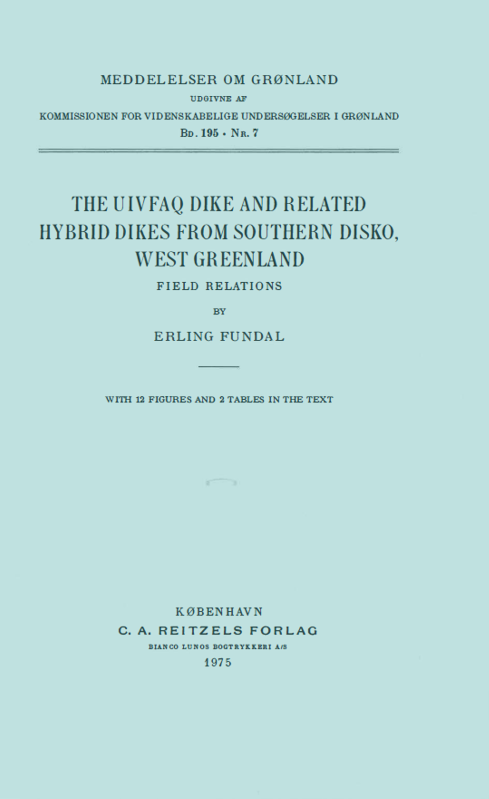The Uivfaq Dike and Related Hybrid Dikes from Southern Disko, West Greenland. Field Relations.
DOI:
https://doi.org/10.7146/mog.v195.148987Abstract
A geological and magnetic study of the Uivfaq locality in southern Disko, which is known for its large boulders of telluric iron, has confirmed that the telluric iron is associated with a dike and not, as was formerly believed by some people, with a basalt flow.
A hitherto unknown dike, situated 15 km west of Godhavn at Kitdlit, seems to be closely related to the Uivfaq dike. The dike has the same strike and dip as the Uivfaq dike and also contains both graphitic xenoliths and native iron. The dike, which intrudes the N-S trending gneiss ridge exposed at several places in southern and central Disko, leaves the gneiss at Kitdlit and continues northwards solely in the basalt.
The dike at Igdlukúnguaq in south-eastern Disko, which contains a large inclusion of nickeliferous pyrrhotite, was also re-examined. Graphitic xenoliths are also present in this dike, which indicates a relationship to the Uivfaq dike. The xenoliths from the Uivfaq dike consist mainly of basic plagioclase with small amounts of red spine! and graphite. The xenoliths from Kitdlit and lgdlukúnguaq
are much more complex and different parageneses involving the following minerals have been found: Corundum, spinel, sillimanite, cordierite, plagioclase. According to the supratelluric theory the telluric iron would have originated through assimilation of carbon-rich sediments by the basalt. Such sediments are indeed present in the Disko-Nugssuaq area. However, the fact that the Kitdlit dike intrudes gneiss but nevertheless contains telluric iron suggests that this theory may be invalid. Another, but narrower dike situated at Kitdlit has a peculiar composition, which together with the xenoliths, may give a hint about the origin of the hybrid constituting the three dikes examined and may explain the origin of related rocks found elsewhere in the Disko-Nugssuaq area.

Downloads
Published
How to Cite
Issue
Section
License
Coypyright by the authors and the Commision for Scientific Research in Greenland. No parts of the publications may be reproduced in any form without the written permission by the copyright owners.

